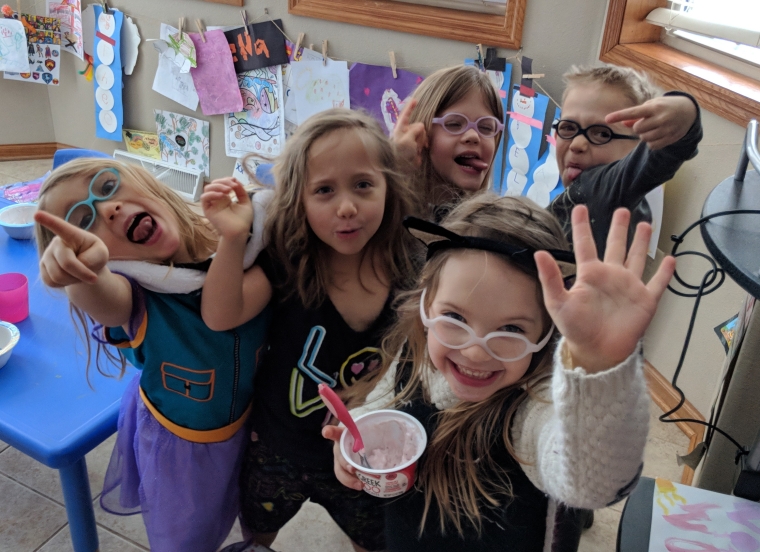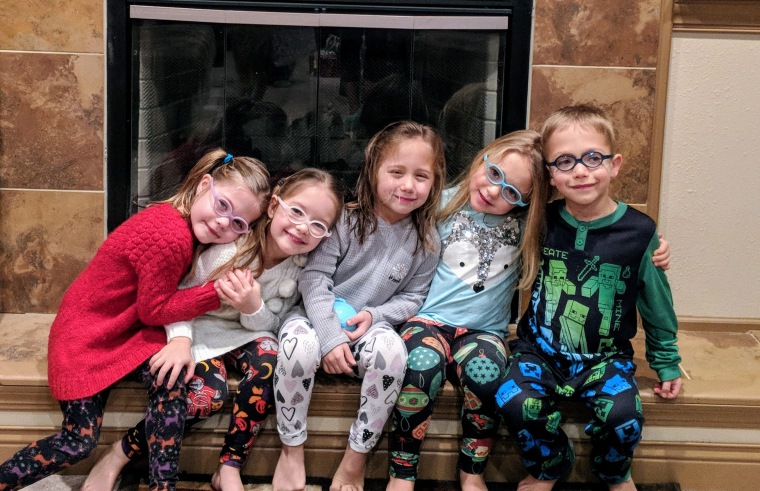
Our house is loud. Our house is competitive. In our house, choices have consequences. Our has a schedule where there is a time to eat, play, sleep and head here and there. There is no doubt that this environment is stressful. I, the keeper of the schedule know that better than anyone. But, our home is also filled with love, laughter, prayer, gratitude, grace and mercy.
This home’s environment is much different than the one I grew up in but the values remain the same. Because of this I see my children evolving to be different than I was when I was younger. They are more confident, outspoken, expressive. They have to share everything from their bedroom to their time. None of this is bad. I just wonder at times what they are thinking and what this experience- this childhood- is really like for them.
There are moments when we find ourselves one-on-one where I catch a glimpse of them with their guard down. Whether it be their soft eyes, gentle smile or genuine laugh, it is then I know that they are doing okay, that they’re going to be okay. Rarely, are there uninterrupted conversations, but now that they can read and write, our conversations have become asynchronous. They can leave us a note, or a picture and we can do the same. It is in these stick figure drawings and scripted words that again I know that they’re going to be okay.
With each passing day they grow up a bit more. They become more independent and more united at the same time. They need others a bit more and us a bit less. While this is hard, I know it is good.

But, I have to consciously combat the worry and the fear that perhaps this environment may perpetuate invisible illness and may pay a toll on their young hearts and minds. Our children, like all others, are developing a sense of mastery of their environment and themselves with each passing day. They can understand reasons for why life is the way it is; these may be logical or magical. I believe it is vital that we, as caregivers, know when to step in and when to step back, in order to foster resilience and not dependency or injury. The following 7 strategies were adapted from the American Psychological Association’s suggestions for fostering resilience across the lifespan.
Strategies to Foster Resilient Families
- Make connections. Relationships expose us to another person’s journey which provides us with perspective and increases the skill of empathy. A strong network of friends and family can also provide social support which can provide a non-judgmental safety net when we fall.
- Empower through Service. Age-appropriate volunteerism can help the helpless.
- Maintain Routine. Most thrive with consistency because it can provide comfort. In times of change, it can be helpful to find rest in celebrating the child’s routine.
- While routine and structure are beneficial if they lead to worry, they become counter-productive. Hit the pause button on life to explore with the child the source of worry. If it is the routine, celebrate spontaneity and re-construct the routine together.
- Practice and Preach Self-care. Finding and making time to care for one’s self through solid nutrition, exercise and rest is pivotal for keeping one’s tank full; this is a necessity to prevent burn-out especially when caring for a child with any illness- visible or invisible. Children will also bare witness to our self-care and establish their own methods.
- Nurture Positivity. Hardship can be handled with greater ease in the context of hope and trusting relationships. Helping a child trust the process, look for the positive and trust themselves to overcome life’s hurdles can build resilience and strengthen their self-efficacy towards present and future difficulties. While children may not be able to assess long-term consequences, we can help them see past the current situation and find hope while exploring optimism amidst fears.
- Accept Change. Change can be scary but learning to accept and roll with change at an early age can foster resilience. Navigating opportunities for self-discovery amidst change continues to build into the child and provides a reflective skill-set which can aid in changing with change.
Big picture
Resilient parents raise resilient children who have “the ability to recover from or adjust easily to misfortune or change” and find calm amidst chaos. This ability to bounce back and grow is not just a process for self-development but a philosophy. We have the opportunity to plant “seeds of strength” and self-care so, our children can overcome the challenges of illness, a busy household, and/or hardships at home, work and school to courageously take on life with grace, generosity and gratitude.

Additional Resources on Resilience
- American Psychological Association. Resilience Guide for Parents and Teachers. Accessed from: https://www.apa.org/helpcenter/resilience
- Child Mind Institute. How to Foster Resilience in Kids. Accessed from: https://childmind.org/article/foster-resilience-kids/
- Psychology Today. The Resilient Child. Accessed from: https://www.psychologytoday.com/us/blog/creative-development/201407/the-resilient-child


